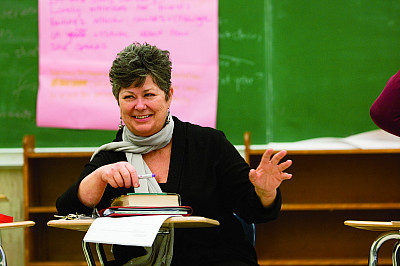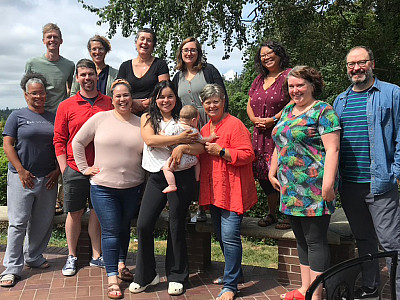Oregon Writing Project Says Goodbye
Longtime OWP director Linda Christensen retired this year, bringing to a close her impactful 35 year career teaching writing throughout Oregon.
As the Oregon Writing Project (OWP) closes its final chapter at the graduate school, we reflect upon three decades of connection, community, and scholarly excellence in writing that this unique and transformative program brought to educators throughout Oregon.

That teacher was Linda Christensen—who would go on to become the long-time director of OWP—and that summer institute would end up changing her entire teaching trajectory and influencing the teaching of writing throughout Oregon for the next 35 years.
Christensen thinks back to that time, and to the people who helped her form an entirely new identity as an educator.
“Mary Kay Healy, a middle school teacher who helped found the Bay Area Writing Project (BAWP), presented a lesson that summer based on work with her students,” she remembers. “I was shocked. Healy was a teacher, not a university professor, using work from her classroom to teach teachers about how to teach writing more effectively.”
“I made the decision that I would return to my classroom and become a teacher researcher like Mary Kay Healy. I would write, teach, think, and present from that platform.”
Christensen uses this anecdote to underscore the point that OWP is unique because it honors teachers and teacher knowledge–it was highly unusual that Healy was a teacher and not a university professor. Christensen also calls attention to Jim Gray, another teacher as well as co-founder of the National Writing project, sharing that he revered teachers and believed that K-12 teachers should become classroom scholars, published writers, and leaders in education. He called it “such an obvious idea.”
“It may have been obvious, but it was also—and continues to be—revolutionary,” continues Christensen.
“It’s not that teachers don’t want to be scholars, writers and leaders in their field, but the hectic pace of classroom life leaves little time for teachers to reflect on their practice, to discuss their research on writing and learning, or to address local and national concerns about education.”
Guided by OWP’s mission of honoring teachers and teacher knowledge, Christensen would go on to found the OWP Summer Institute at Lewis & Clark as well as the OWP coaching program.

Matt Reed, Ursula Wolfe-Rocca, Katharine Johnson, Kim Kanof, Heather Barcan, Mark Hansen. Front, L to R:
Kara Stroman, Evan Tyler, Mariela Tyler, Camila Arze Torres Goitia, Linda Christensen, Amy Lindahl“Both of these opportunities provided teachers with a space to become the classroom scholars Jim Gray wanted us to be,” she says.
Each summer for the next 35 years, teachers would gather to rehearse workshops to present for their colleagues and at local and national conferences; they would write articles for publication in local and national journals; and they became teachers of teachers in multiple roles — as coaches, as principals, as union leaders and superintendents.
“The model of teachers teaching teachers became the center of the best district professional development because it drew on the expertise of teachers based on their ongoing classroom work.”
However, as the landscape of K-12 education is changing, so is the landscape of K-12 professional development. Continuing education now takes place more internally, within the school building. Teachers have less flexibility and funding to seek out their own professional development opportunities, and enrollment in continuing education courses and workshops designed exclusively for teachers has steadily declined over the years.
The Center for Community Engagement, departmental home of OWP, continues to offer programming that is relevant for educators, primarily focusing on interdisciplinary offerings that bring together those working in other school-based roles, mental health or other youth-serving professionals.
So as we say goodbye for now, the spirit of OWP will be carried forward as we continue to honor teachers and teacher knowledge.
For more information about the history of OWP at the Graduate School, visit our website.

